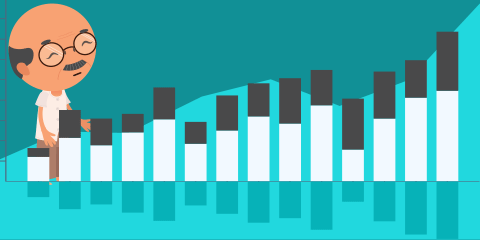Why should you invest? The answer is very simple: to create wealth. And why would you want to create wealth? Well, to fund various financial goals you may have in your life like buying an expensive TV, going for a foreign holiday, retirement, and so on.
Get updates from Value Research in your inbox
The trouble is that most of us have a single source of income and there are various needs that are immediate, medium term and long term. If we move from one goal to to the other with our accumulated savings, we would be left with almost nothing for our long-term goals. That is why it is important to not just keep money in the savings bank, but use it to make investments that will help you create wealth over a long period of time.
If you start your investments as early as possible, you will be in for a pleasant surprise. This is because time and compounding interest are a lethal combination that will multiply your wealth beyond your imagination over a long period of time.
Consider this example: Ram and Rahim are friends, both are 30 years. Ram invests R1,000 every month for his retirement. He manages an annual return of 12 per cent on his investments and succeeds in amassing a neat corpus of a little over R35 lakh at the end of 30 years. Rahim does nothing for 20 years. He suddenly wakes up 10 years before his retirement and starts investing R12,000 every month for the next 10 years. He also manages to pocket an annual return of 12 per cent on his investment. However, at the end of the exercise, Rahim managed to create only around R27 lakh for his retirement.
How is it possible? Ram was investing a measly R1,000 whereas Rahim was investing R12,000 every month. Well, it is possible because of the compounding interest. Some people call the eight wonder of the world because of its power to multiply money over a long period. If you invest in a disciplined manner and give you investments plenty of time, you can achieve most of your goals without much pain. For some academic interest, how much do you think Rahim will have to invest to create a corpus of R35 lakh? Well, he will have to invest around R15,000 per month for 10 years to create that kind of corpus.
If you are still not inspired enough to start your investment plan right away, here is a quick list of habits that stops you from being rich.
Waiting for the perfect plan: Spending months or years to come up with a fool-proof investment plan is not a great idea. There is no guarantee that your perfect plan indeed is going to be perfect. So, start right away.
Starting late: It is extremely difficult or almost impossible to catch up with someone who has started investing regularly much earlier. Even with a very large investment, you would find it difficult to catch up. Once again, start now.
Investing for short-term: Try to think beyond a few months or a year. You think of short-term investments only when you have short-term goals. Long-term goals need long-term investments. The basic rule: stick to debt investments for goals that are below three years. Invest in equity if your goal is five years away or longer.
Playing it safe: You can’t build a large corpus with small investments in debt schemes. If you want anything substantial over inflation, you should invest in stocks. Get rid of the fear of stocks and invest in stocks for your long-term goals.
Looking for tips: Don’t waste time looking for tips to get rich quick. Most of these tips would do exactly the opposite: rob you a chance of making money on your investments. If you got your basics right, shut out all the noise and stick to your plan. Take our word for it: you would be rich one day.
Trading is not investing: Getting in and out of investments, especially equity investments, is not a great idea. You would pay higher taxes on such frequent sale and purchases. It also would rob you a chance to make spectacular returns from your investments over a long period. Giving time to your investment is key to create wealth over a long period.


